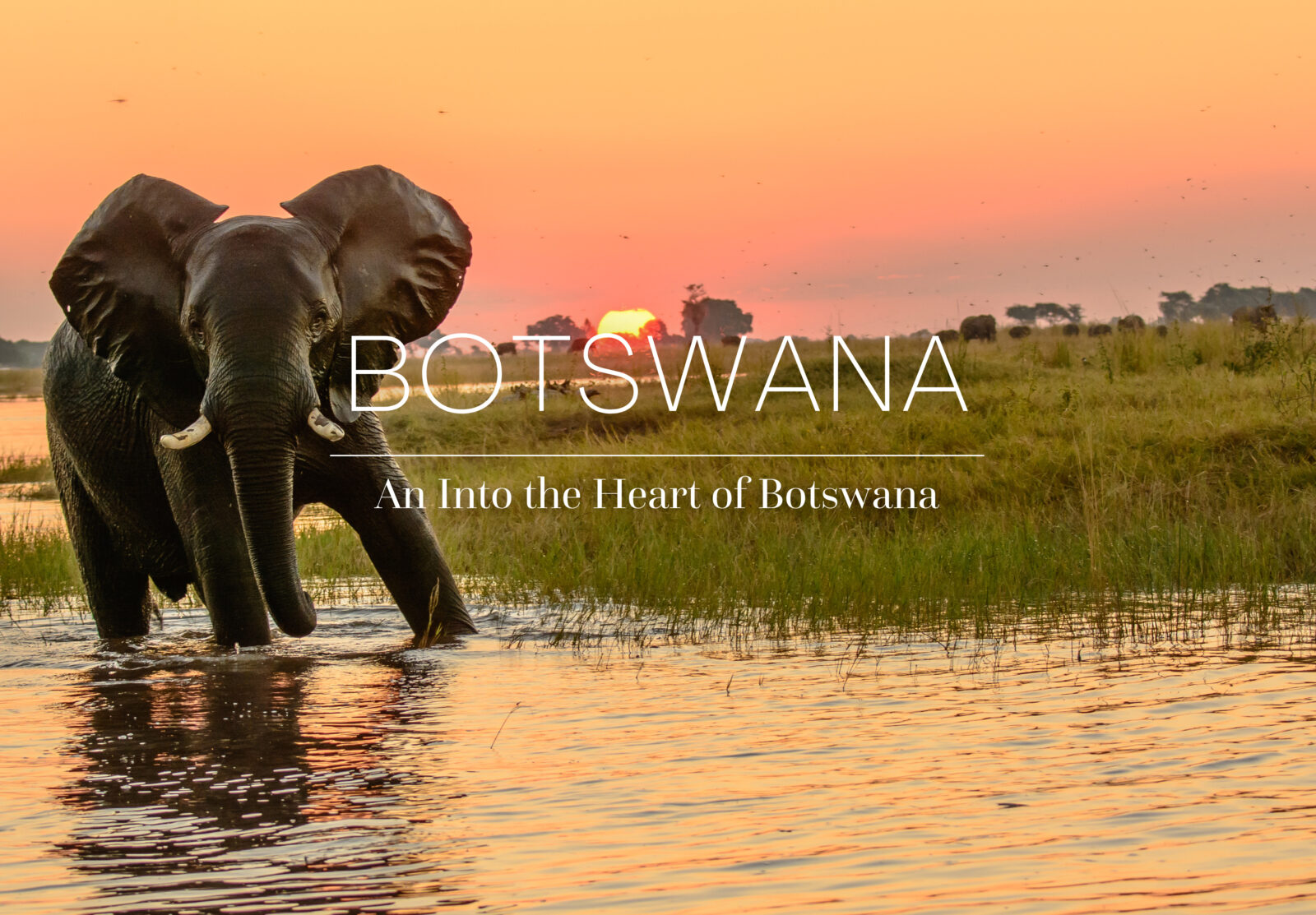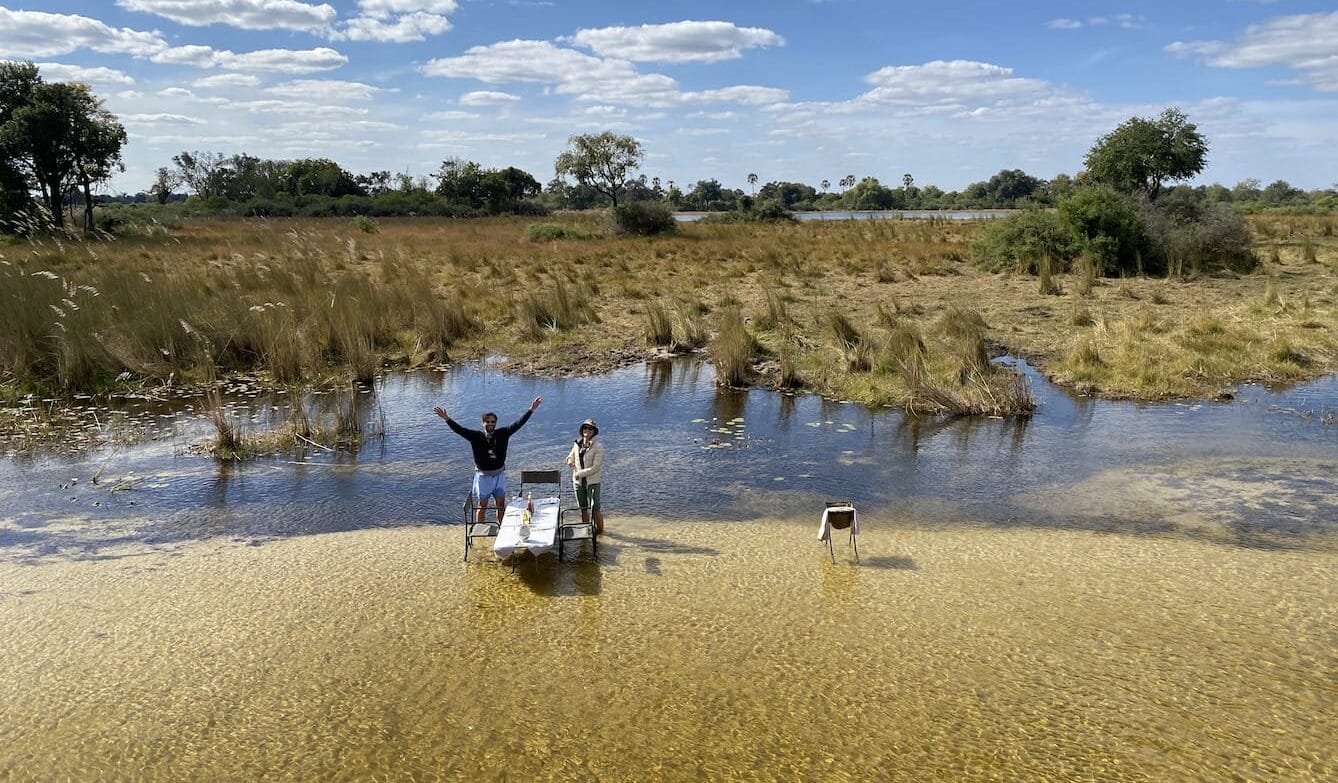
A Safari Journal by Danni Ponter
There’s a moment just before dawn in the Okavango Delta when the world holds its breath. The canvas of your tent stirs gently in the pre-dawn breeze. The first bird calls filter through the silence, a fish eagle’s cry, sharp and ancient. You step onto your private deck, bare feet on warm wood, and pause. Everything feels close. Because it is.
This is Botswana. This is where you and nature become one.
Day One: From Thunder to Whispers
My journey began where most Botswana adventures do at Victoria Falls. Standing on the edge of that churning abyss, feeling the spray on my face, I was reminded that nature here doesn’t ask permission. It simply is, in all its overwhelming power.
I spent the night at The Palm, a riverside gem where the Zambezi flows past your terrace and the sound of hippos grunting becomes your lullaby. There’s something perfect about beginning a safari this way, starting with grandeur, then moving toward intimacy.
The next morning, a short flight to Kasane, then onward to Savute. As the small plane banked over the landscape, I watched Botswana unfold below: a patchwork of waterways, islands, and golden plains that seemed to stretch forever.
Savute: Where Giants Gather
Savute Safari Lodge sits perched above a channel where drama unfolds daily. From the underground hide a viewing bunker at eye level with the waterhole, I watched a parade of elephants arrive. First, a matriarch with her family. Then another. And another. Within an hour, more than fifty elephants surrounded the water, tusks gleaming in the afternoon light.
Our guide, Moses, pointed out the subtle language between them: the ear flicks, the trunk touches, the rumbling that vibrates through your chest before you hear it. “That’s them talking,” he said quietly. “They’re deciding who drinks first.”
I could have stayed in that hide forever.
That evening, on a game drive, we found a pride of lions lounging impossibly close to the road. The females dozed while cubs tumbled over each other, practicing the hunting skills they’d need to survive. One cub approached our vehicle, sat down, and simply stared at us with those golden eyes.
Moses smiled. “He’s wondering what you are.”
I was wondering the same thing about him.
The Boteti River: A Theatre of Life
After three nights watching predators prowl through Savute, we flew east to Leroo la Tau on the Boteti River. If Savute was about drama, the Boteti was about abundance.
The lodge sits on a ridge overlooking the river valley, and the view from the deck rivaled anything I’d seen in the Masai Mara. Thousands of zebras striped the plains below. Wildebeest grazed in scattered herds. Giraffes browsed on acacia trees, moving with that peculiar slow-motion grace that makes them look like they’re underwater.
“This is why Botswana is special,” said our guide, Kgosi. “Low numbers of tourists, high numbers of everything else.”
We spent a morning at a hide photographing wildlife at a waterhole. A parade of species came and went: zebras nervous and skittish, wildebeest moving in organized chaos, a lone kudu bull with spiral horns that caught the light like polished mahogany.
Then the elephants arrived, and everyone else left.
Makgadikgadi: Standing on the Edge of Forever
There are places that change you. Makgadikgadi Pans is one of them.
We flew in a tiny plane over endless white salt flats that looked like snow, landing at Jack’s Camp, a collection of canvas tents that felt like they belonged in a 1920s explorer’s dream. Persian rugs, clawfoot bathtubs, crystal decanters. The kind of place where “roughing it” means your gin and tonic comes with hand-cut ice.
But the luxury was secondary to the landscape.
That first evening, we drove out onto the pans as the sun began to set. The light turned everything gold, then pink, then purple. The horizon became indistinguishable from the sky. We were floating in space.
Our guide stopped the vehicle in the middle of that vast emptiness. “Listen,” he said.
We listened.
Nothing. Pure, complete, absolute silence.
Then, from somewhere impossibly distant, the call of a springbok. Just one small sound in all that space, and it felt like a miracle.
The next morning, we visited a group of habituated meerkats. They emerged from their burrows at sunrise, standing on hind legs to scan for predators, then going about their business as we sat nearby. One climbed onto my boot to get a better vantage point. Another groomed its companion with focused intensity.
Later, we spent time with a San Bushman tracker named Kgosi, who showed us how his people have survived in this harsh environment for millennia. He pointed out plants I would have walked past—this one holds water, this one treats stomach ailments, this one makes poison for hunting arrows.
“The Kalahari looks empty,” he said, smiling. “But it’s full of life if you know how to look.”
The Okavango Delta: Where Water Writes the Story
Saving the best for last, we flew into the Okavango Delta, that impossibility of water in the desert, where rivers flow inland and disappear into sand, creating the world’s largest oasis.
We landed at Camp Okavango, built on a private island in the permanent delta. That first afternoon, we explored by mokoro, a traditional dugout canoe poled by a local guide named Tshebo. He navigated channels so narrow that papyrus brushed both sides of the boat, then opened into lagoons where hippos surfaced and submerged with rhythmic regularity.
“Stay quiet,” Tshebo whispered. “We’ll pole past them.”
Past them. As in, within meters of creatures that can bite a crocodile in half.
But Tshebo knew every hippo in this area, knew their temperaments, knew when to push forward and when to wait. We glided through like ghosts, and the hippos barely acknowledged us.
The walking safaris in the Delta were revelatory. With an armed guide leading the way, we tracked elephants through mopane woodland, identified birds by their calls, and learned to read the stories written in the sand.
“See this track?” our guide asked, pointing to a perfect leopard pugmark. “From last night. He walked right past camp.”
Every step felt significant. Every rustle in the grass demanded attention. This wasn’t viewing wildlife from a vehicle, this was being in their world, playing by their rules.
One morning, we came upon a breeding herd of elephants at a waterhole. We stood behind a tree line, downwind, and watched. A baby elephant discovered his trunk for the first time, swinging it experimentally and managing to spray himself in the face. The matriarch drank deeply, then turned and looked directly at us.
Our guide froze. We froze.
She held our gaze for what felt like hours but was probably thirty seconds. Then she turned back to the water, satisfied that we weren’t a threat.
My heart was pounding. My hands were shaking. I’ve never felt more alive.
The Last Night: Stars and Stories
On our final evening, the camp arranged a sleep-out deck experience. After dinner, we were escorted by lamplight to a platform overlooking a lagoon. A comfortable double bed sat under mosquito netting, open to the sky.
As night fell, the stars emerged. Not dozens. Not hundreds. Millions. The Milky Way wasn’t a smudge of light, it was a river of brilliance flowing across the heavens.
Hippos grunted in the lagoon below. Something splashed a crocodile? A fish? The night was full of sounds I couldn’t identify, a symphony of the wild.
I lay there thinking about everything we’d seen: the elephants at Savute, the silence of the salt pans, the leopard tracks in the sand, the meerkat on my boot, the hippos we’d poled past in the mokoro.
Botswana doesn’t give you wildlife. It gives you wilderness. It gives you immersion. It gives you a glimpse of the world as it once was and in a few precious places, still is.
Why Botswana Matters
As I flew out the next morning, circling over the Delta one last time, I understood something important: Botswana isn’t trying to be accessible. It’s not trying to make safari easy or comfortable or convenient.
Botswana is protecting something precious by limiting access, by keeping numbers low, by insisting that tourism serves conservation rather than the other way around.
The result? A place where elephants outnumber people. Where predators still hunt as they have for millennia. Where you can stand in silence on a salt pan and hear absolutely nothing but your own heartbeat.
This is what sets Botswana apart from every other safari destination on Earth. It’s not trying to show you Africa. It’s inviting you to be in Africa to sleep under its stars, walk its ancient paths, float its waterways, and carry home memories that feel less like a vacation and more like a pilgrimage.
Planning Your Own Botswana Journey
If this story stirred something in you, if you felt that pull toward wilderness, toward authenticity, toward experiences that change you then Botswana is calling.
At Sikeleli, we’ve been crafting journeys through Botswana for a decade. We know which camps offer the best walking safaris, which guides can track leopards by sound, which seasons bring the zebra migration, and which experiences will match your specific travel style.
Whether you dream of luxury lodges or mobile camping, of mokoro trails or helicopter flights, of family adventures or romantic escapes, we’ll craft the journey that brings you home, changed.
Ready to explore Sikeleli’s Signature Collection and discover more extraordinary destinations? [Explore all 10 signature journeys here]
Or dive deeper into Botswana’s possibilities: [Read our complete guide to Botswana safari planning]
Have questions about traveling to Botswana? Reach out to our team:
Karen: karen@sikelelitravel.com | Fungai: fungai@sikelelitravel.com | Leonie: Leonie@sikelelitravel.com | Danni: danni@sikelelitravel.com







